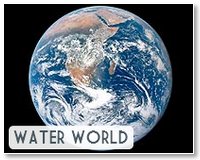| . |  |
. |
Hanoi (AFP) June 23, 2010 Billions of dollars -- mainly from China -- are being poured into a fast-growing global system of rewards for people who protect endangered water resources, according to a study released Wednesday. The programmes, implemented by governments as well as the private sector and community groups, "could help avert a looming global water quality crisis," according to the report by Ecosystem Marketplace, a project of US-based non-profit organisation Forest Trends. It said the "emerging marketplace" of watershed payments and trading in pollution reduction credits was still dwarfed by the system of carbon trading aimed at limiting damaging greenhouse gases, but was expected to rise. The study focused on two main instruments, Payments for Watershed Services (PWS), in which farmers and forest communities are compensated for maintaining water quality, and Water Quality Trading (WQT) where industry buys and sells pollution reduction "credits". Transactions support a range of activities including adjusting land management practices, technical assistance, and improving water quality, according to the report funded by the United States and The Netherlands. The report conservatively estimated the total transaction value of active PWS and WQT initiatives at 9.3 billion dollars worldwide in 2008. This included about 7.8 billion dollars, all of it in PWS schemes, from China where the central government has called for development of "eco-compensation mechanisms". Much of these Chinese payments -- which compare with a figure of just over one billion dollars in 2000 -- go to farmers to reduce their pollution around forested areas, the report added. "The number and variety of PWS schemes in China have escalated in recent years, from around eight in 1999 to more than 47 in 2008... impacting some 290 million hectares (716 million acres)," it said. "The picture in the rest of Asia is much less robust," it added. In the United States, PWS payments doubled to 1.35 billion dollars in 2008 from 629 million dollars in 2002, said Ecosystem Marketplace. After China, Latin America had the largest number of active PWS programmes in 2008, with 36, it said. Water Quality Trading is found mostly in the United States, and accounted for less than 11 million dollars globally in 2008, it added. Among the threats to global water supply are years of unchecked fertilizer runoff that have led to oxygen-starved "dead zones" in the Gulf of Mexico, the researchers said in a statement.
Share This Article With Planet Earth
Related Links Water News - Science, Technology and Politics
 Flood creates a U.S. canyon in three days
Flood creates a U.S. canyon in three daysPasadena, Calif. (UPI) Jun 22, 2010 A U.S. geologist and geographer say they are studying the recent flood-caused creation of a Texas canyon to gain insight into ancient flooding events on Mars. The researchers - Assistant Professor of geology Michael Lamb of the California Institute of Technology and Associate Professor of geography Mark Fonstad of Texas State University - said a week of heavy rainfall in 2002 formed a ... read more |
|
| The content herein, unless otherwise known to be public domain, are Copyright 1995-2010 - SpaceDaily. AFP and UPI Wire Stories are copyright Agence France-Presse and United Press International. ESA Portal Reports are copyright European Space Agency. All NASA sourced material is public domain. Additional copyrights may apply in whole or part to other bona fide parties. Advertising does not imply endorsement,agreement or approval of any opinions, statements or information provided by SpaceDaily on any Web page published or hosted by SpaceDaily. Privacy Statement |